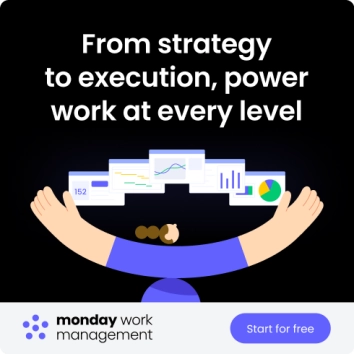Annual reviews and static spreadsheets were built for a different era of work. Today, they create a gap between high-level strategy and daily execution, leaving teams without a direct line of sight into how their efforts contribute to company goals. To build a confident, aligned team, you need a system that moves at the speed of your people and turns scattered work into streamlined performance.
The right performance management software closes this gap by connecting individual contributions to your biggest objectives. A flexible platform like monday work management provides the structure to build these workflows, making progress visible and feedback continuous. This guide walks you through choosing the right solution for your team. We’ll review the top platforms and provide a game plan to help you build a culture of high performance.
Get started with monday work managementKey takeaways
- Performance management software helps teams track goals, feedback, and progress in one place.
- Modern systems support continuous conversations instead of relying only on annual reviews.
- Features like goal tracking, flexible review cycles, and analytics help teams stay aligned and make timely decisions.
- Integrations with HR and productivity tools create a smoother, more connected workflow.
- monday work management gives teams a flexible structure to build performance processes that fit how they work.
What is performance management software?
Performance management software is your team’s digital workspace for turning scattered feedback and disconnected goals into a unified game plan. It replaces siloed spreadsheets and forgotten check-ins with a single, transparent view of progress, so everyone knows exactly where they stand and what to do next.
Instead of relying on a dreaded annual review that focuses only on what happened last year, this approach creates a rhythm of continuous, forward-looking conversations. It builds momentum, empowering your team to tackle challenges and celebrate wins as they happen.
The right platform links individual contributions directly to company-wide objectives, giving everyone a direct line of sight to the impact of their work. By automating manual tracking and surfacing actionable insights, you free up managers to be coaches, not administrators, creating a culture of confidence and high performance.
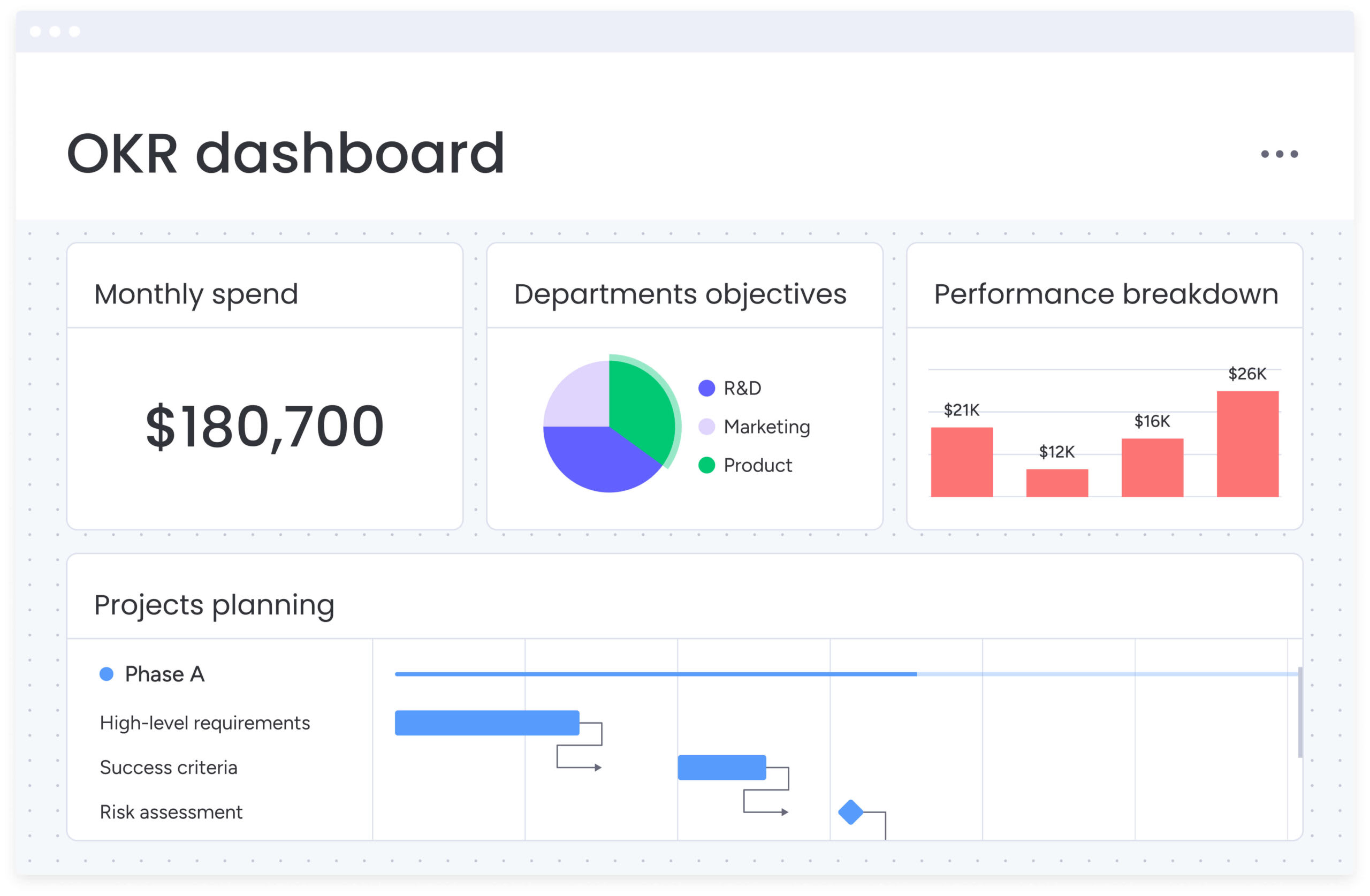
Why modern teams need a performance management solution
In distributed and fast-moving environments, important work can be difficult to track. A modern performance management system brings visibility to contributions and supports fair, consistent development conversations grounded in data.
Today’s employees expect clear expectations, growth pathways, and ongoing feedback. A structured system helps teams stay aligned, reduces bias, and promotes transparent development.
Because work moves quickly, annual reviews alone are no longer enough. A modern solution supports real-time feedback and keeps everyone working toward the same goals, creating a continuous cycle of improvement for individuals and the organization.
8 top performance management software platforms reviewed
Finding the right performance management platform is about more than just features; it’s about finding a system that fits how your team works. We looked past the marketing noise to focus on what truly matters: how each platform helps you connect high-level strategy to daily execution. Consider this your playbook for choosing a system that streamlines how work gets done.
So many teams are held back by scattered information and disconnected goals, which makes hitting targets feel like a constant uphill battle. The best software doesn’t just measure what happened—it brings everyone onto the same page, turning siloed efforts into a unified force and building momentum instead of just running reports.
We put these platforms to the test against the real-world chaos of murky priorities and missed deadlines. Our review pinpoints the platforms that do more than track projects; they build the alignment and confidence your team needs to execute flawlessly. Let’s find the one that will help your team win.
1. monday work management
monday work management is a flexible platform that brings your team’s work and data into one place. By connecting individual work to broader goals, it gives you a clear view of progress across the organization. Because it’s adaptable, you can build the exact workflows you need for performance tracking.
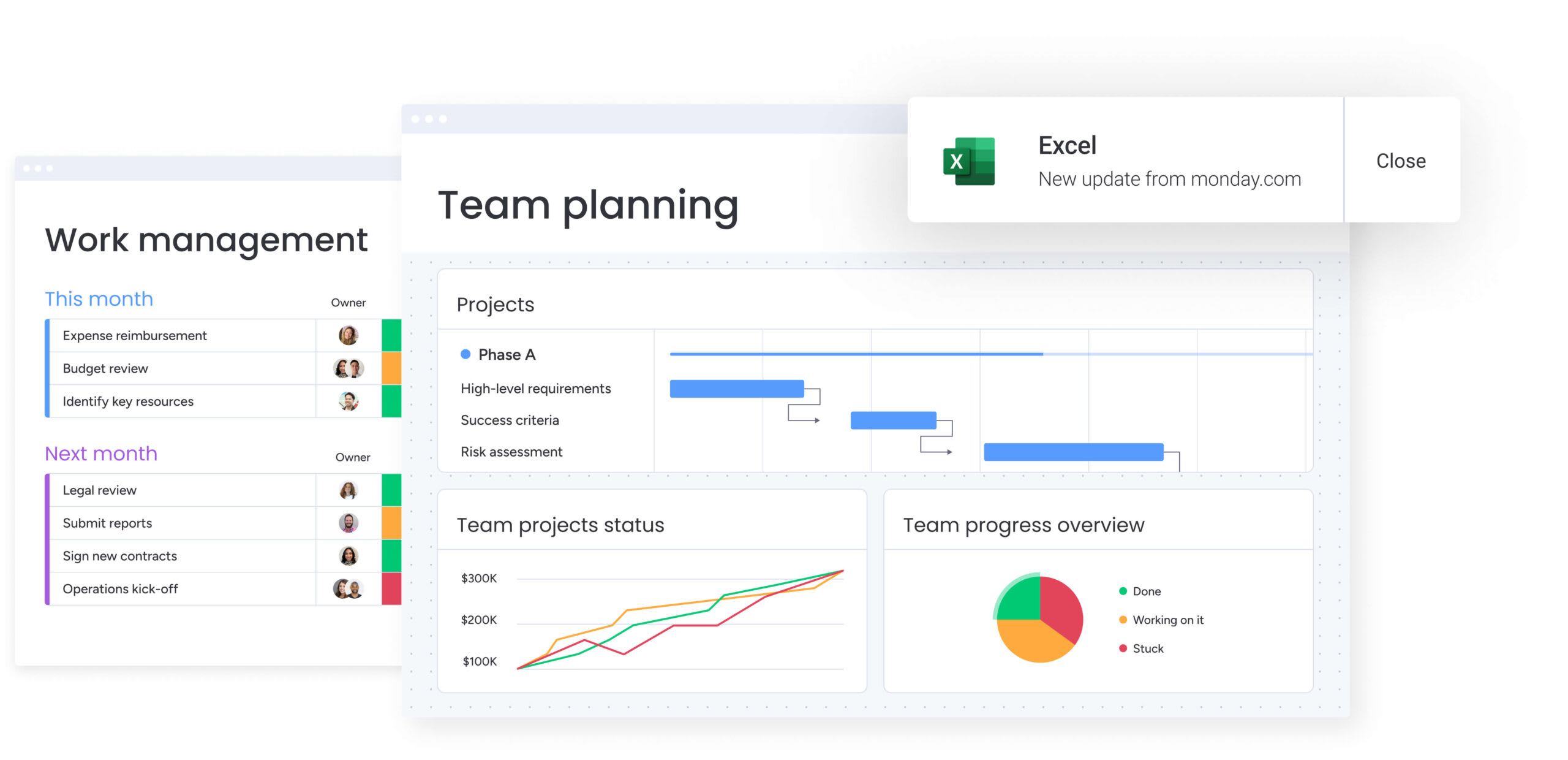
Example:
monday work management acts as a central hub for managing projects and tracking team performance. Its customizable boards and dashboards help align team efforts with strategic business goals in real-time.
Key features:
- Customizable workflows that adapt to your team’s processes without needing to code
- Visual dashboards and charts that track team and project performance metrics in real-time
- Goal and OKR tracking that aligns team objectives with company-wide strategic initiatives

Pricing:
- All paid plans require a 3-seat minimum.
- Free: $0 forever for up to 2 seats, including up to 3 boards and basic tracking features
- Basic: $9 per seat/month (billed annually) with unlimited viewers and items
- Standard: $12 per seat/month (billed annually) with timeline views and 250 automation & integration actions per month
- Pro: $19 per seat/month (billed annually) with private boards and 25,000 automation & integration actions per month
- Enterprise: Custom pricing with enterprise-grade security and 250,000 automation & integration actions per month
- Annual billing saves up to 18%
- Discounts are available for nonprofit organizations
Why it stands out:
- Extreme customizability allows you to build workflows that perfectly match your team’s needs and culture
- The friendly, visual interface helps get everyone on board faster than with more traditional software
- Its integrated interface connects performance tracking to your team’s daily work, projects, and strategic plans
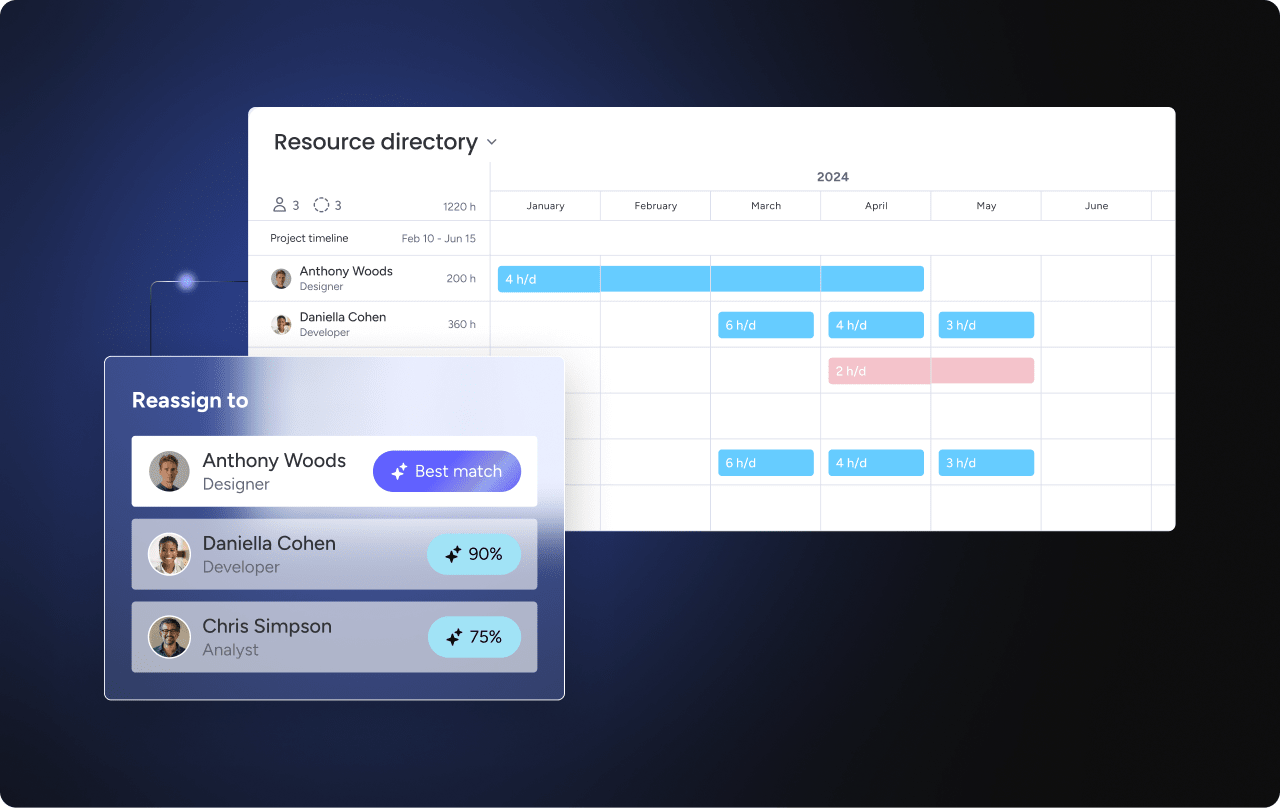
Advanced AI features:
- AI assistant helps identify opportunities and suggests proactive measures to maintain project momentum
- Automatically generates project plans with AI-suggested tasks and milestones based on your goals
- Smartly categorizes and summarizes work items and requests at scale, helping reduce manual administrative work
Automations:
- A visual automation builder with 200+ templates to handle recurring processes, notifications, and status updates
- No-code conditional logic that can trigger check-ins, reminders, and other actions based on your custom rules
- Enterprise-level automation supports up to 250,000 actions monthly for complex, cross-departmental workflows
Integrations:
- Connects with over 200 popular tools like Slack, Microsoft Teams, Google Drive, and various HR platforms
- API access lets you build custom integrations with your existing systems and data sources
- One-click setup for many enterprise tools ensures data flows smoothly across your entire tech stack
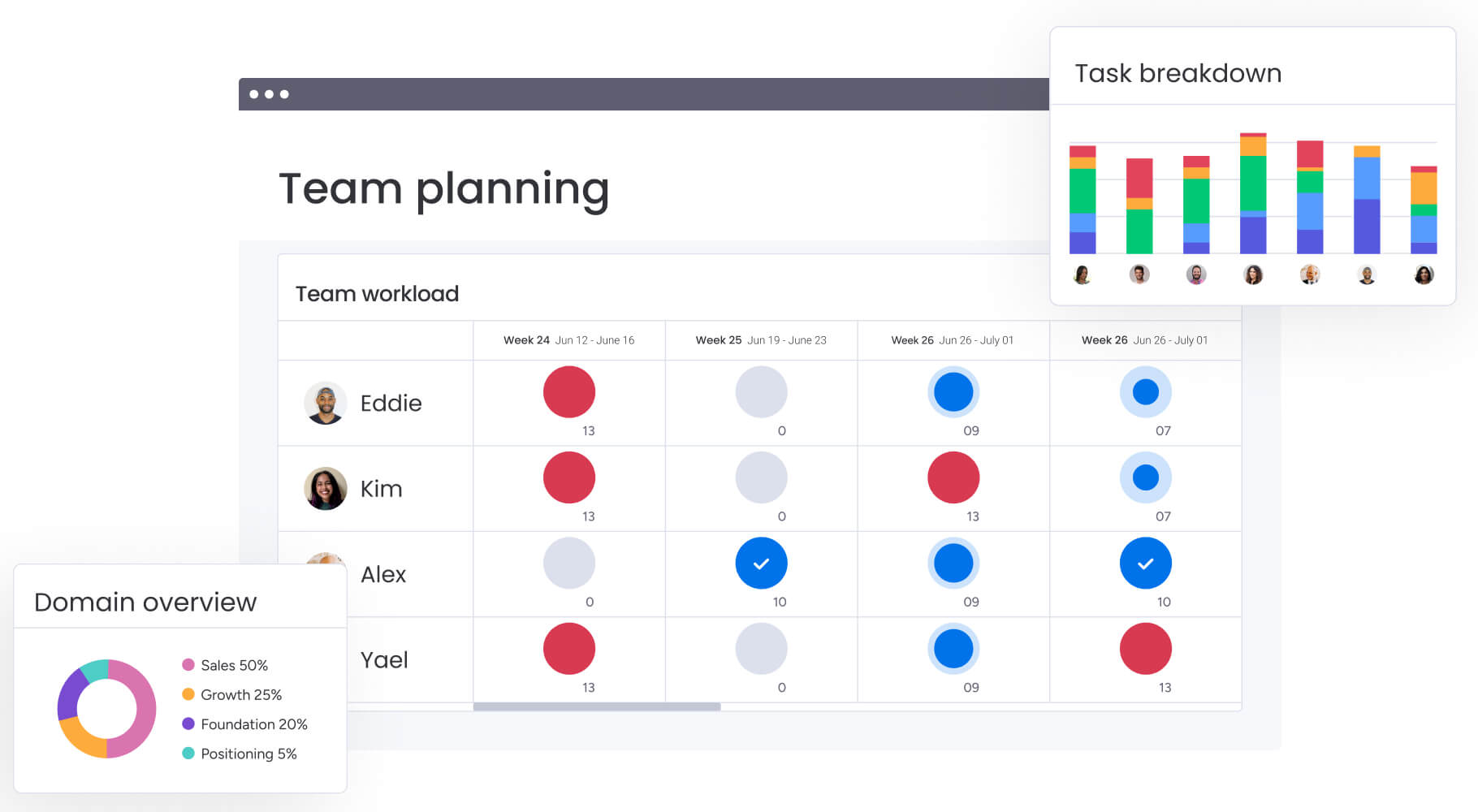
Relevant platform features:
- Goals and OKRs tracking connects team performance to strategic business objectives with clear, visual progress bars
- Resource management gives you a clear view of team workloads, helping you set balanced expectations and prevent burnout
- Advanced reporting and analytics deliver insights into performance trends, helping you spot opportunities for growth and development
2. Asana
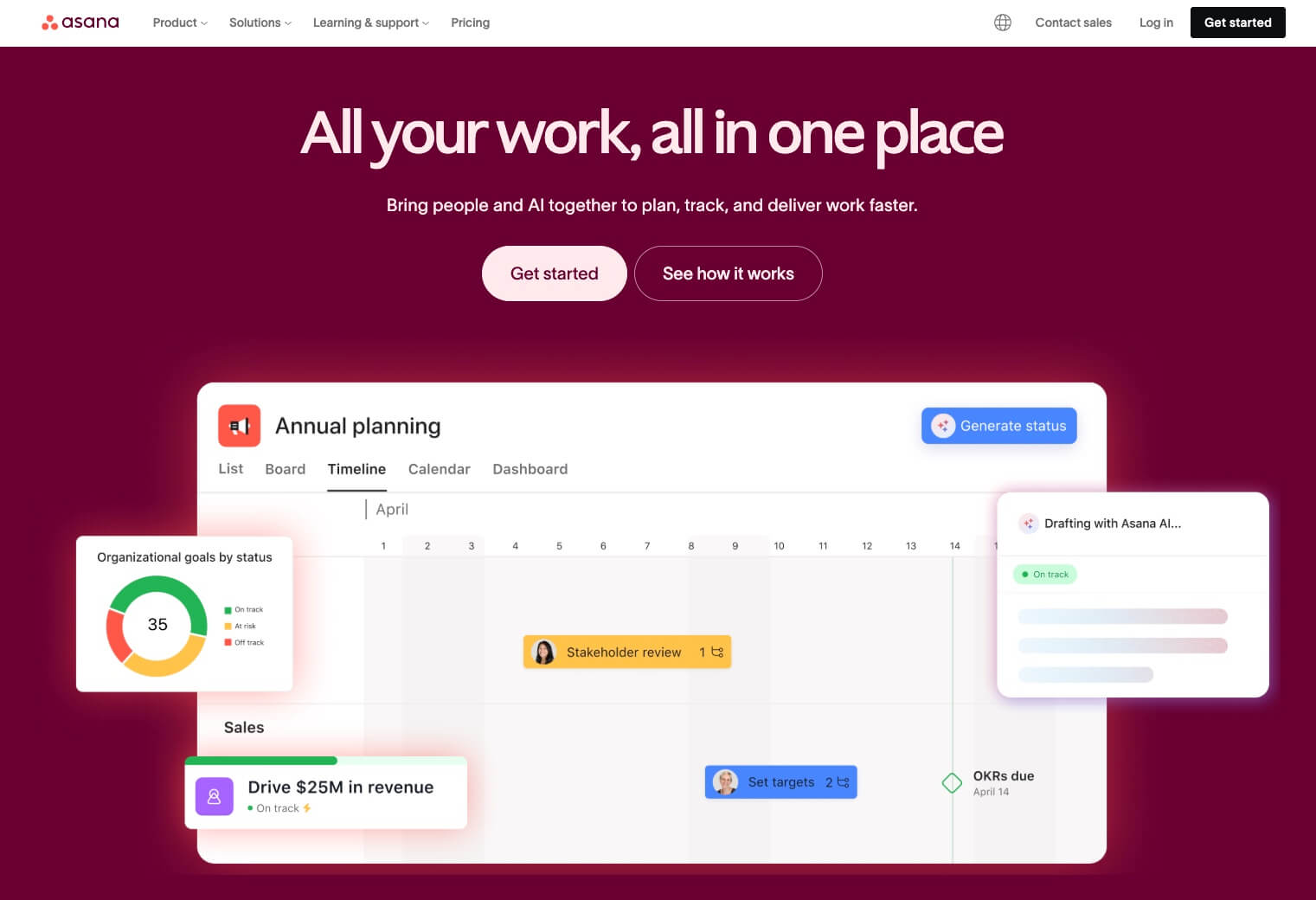
With a focus on transforming scattered tasks into organized, goal-aligned execution, Asana offers comprehensive work management software. The platform specializes in connecting daily work to strategic objectives through intuitive project views and robust OKR tracking, making it ideal for teams that need visibility into how their efforts drive business results.
Example:
This platform is most effective for teams needing to bridge the gap between strategic planning and daily execution, helping them understand how individual contributions connect to larger organizational goals.
Key features:
- Multiple project visualization options including lists, Kanban boards, timeline views, and calendars to match different team preferences
- Built-in Goals feature for comprehensive OKR management and progress tracking against strategic objectives
- Advanced automation capabilities with 200+ pre-built recipes to eliminate repetitive work and streamline workflows
Pricing:
- Personal: $0 (Free forever for up to 10 teammates)
- Starter: $10.99/month per user (billed annually) or $13.49/month (billed monthly)
- Advanced: $24.99/month per user (billed annually) or $30.49/month (billed monthly)
- Enterprise: Contact sales for pricing
- Enterprise+: Contact sales for pricing
- Nonprofit discount: 50% off Starter and Advanced annual plans
Considerations:
- Limited native time tracking functionality requires third-party integrations for comprehensive time management
- The “one-assignee-per-task” rule can create bottlenecks for collaborative work that requires multiple team members to share responsibility
3. 15five
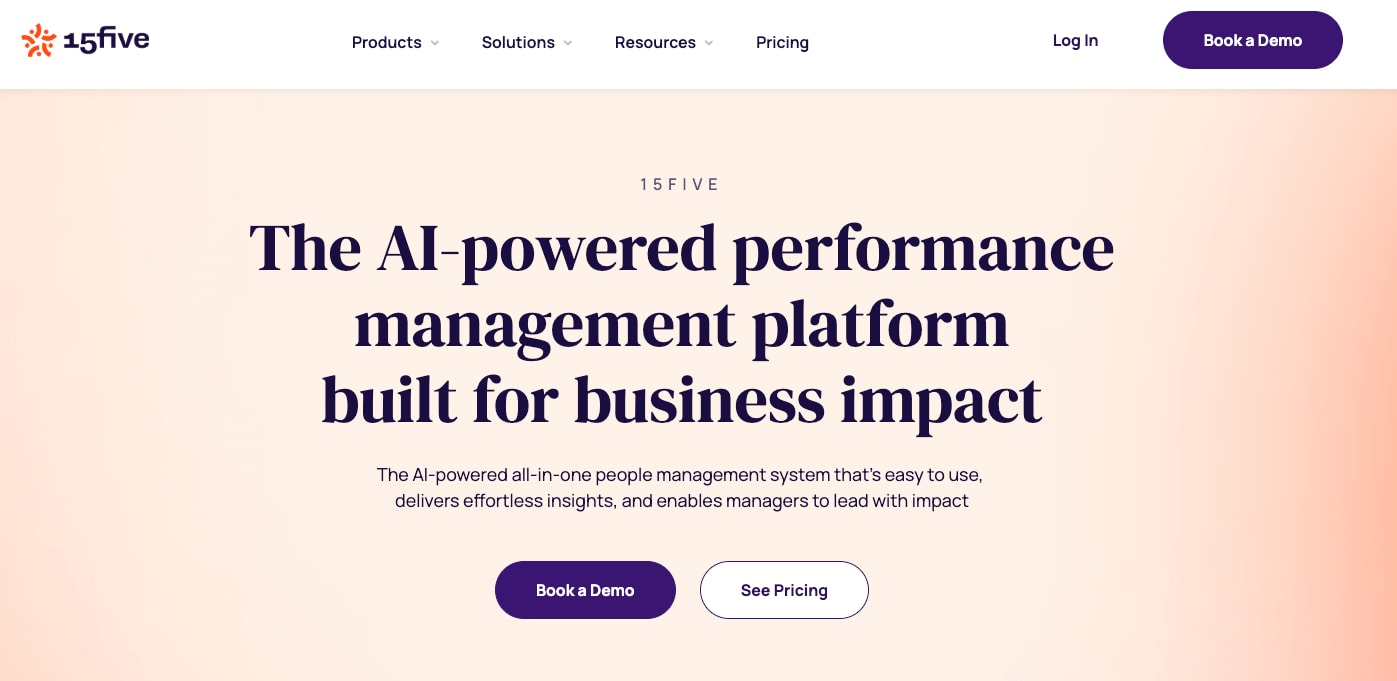
Built around the concept of continuous performance management, 15five facilitates weekly check-ins and real-time feedback loops. The platform specializes in human-centered performance conversations, making it ideal for small to medium-sized businesses looking to replace traditional annual reviews with ongoing development.
Example:
Its primary function is to shift performance management from an annual burden into a continuous conversation that builds stronger manager-employee relationships and drives engagement.
Key features:
- Weekly check-ins that take employees 15 minutes to complete and managers 5 minutes to review
- OKR tracking with automatic progress updates through integrations with Slack, Salesforce, and Jira
- AI-powered manager coaching through Kona that provides real-time guidance during virtual meetings
Pricing:
- Engage: $4/month per user (billed annually) – includes employee engagement surveys and benchmarking
- Perform: $10/month per user (billed annually) – adds performance reviews, OKRs, and 360° feedback
- Total Platform: $16/month per user (billed annually) – includes everything plus HR outcomes dashboard
- Kona AI coaching: $29/month per manager (billed annually) – AI-powered coaching tailored to individual situations
- Compensation Package: $9/month per user (available to current customers) – includes compensation reviews and benchmarking
Considerations:
- Limited project management capabilities compared to dedicated work management platforms
- Weekly check-ins can feel repetitive without proper implementation and manager buy-in
4. BambooHR

As a comprehensive, HR-centric solution, BambooHR transforms scattered employee data into streamlined people operations. The platform specializes in seamless HRIS integration with performance tracking, making it ideal for small to medium-sized businesses ready to move beyond spreadsheets.
Example:
The system’s strength lies in centralizing performance management within your core HR system, creating a single source of truth for employee goals, feedback, and assessments alongside payroll and benefits data.
Key features:
- Goal setting and tracking: Collaborative goal management with automated reminders and milestone tracking aligned to company objectives
- 360-degree feedback system: Continuous feedback loops with peer reviews, manager assessments, and employee self-evaluations
- Automated performance reviews: Streamlined review cycles with research-validated templates and built-in compliance tracking
Pricing:
- Flat rate: Monthly pricing for companies with 25 employees or fewer
- Per-employee pricing: Monthly per-employee rate for companies with more than 25 employees
- Volume discounts: Automatically applied as employee count increases
- Nonprofit discount: 15% off for registered nonprofit organizations
- Bundle discount: 15% off when combining Payroll and Benefits Administration (US-based employees only)
- Contact BambooHR directly for exact pricing quotes
Considerations:
- Performance management tools are only available in the higher-tier “Pro” plan, not the basic “Core” package
- Limited to four formal reviews per year, which may not suit teams requiring more frequent formal check-ins
5. PerformYard

For mid-market companies seeking flexibility, PerformYard provides a dedicated platform that transforms scattered review processes into streamlined, meaningful conversations. The platform specializes in flexible customization and unlimited customer support, making it ideal for companies seeking to build performance cultures without rigid methodologies.
Example:
It’s designed to empower HR teams by automating manual review processes while maintaining the human-centered approach that drives authentic feedback and employee development.
Key features:
- Customizable review cycles supporting quarterly, 360-degree, project-based, and anniversary reviews with flexible timing
- Goal cascading and tracking system that connects individual objectives to organizational priorities
- Continuous feedback tools including recognition, peer feedback, and searchable feedback history
Pricing:
- Performance Management: $5–$10 per person per month (billed annually)
- Employee Engagement add-on: $1–$3 per person per month when bundled
- Meetings add-on: $2–$4 per person per month when bundled
- Enterprise discounts available for larger organizations
- No additional fees for onboarding, training, or customer support
Considerations:
- Limited market presence compared to larger performance management software companies like Workday or Cornerstone OnDemand
- Lacks advanced AI-powered features for feedback synthesis that some competitors offer
6. Lattice
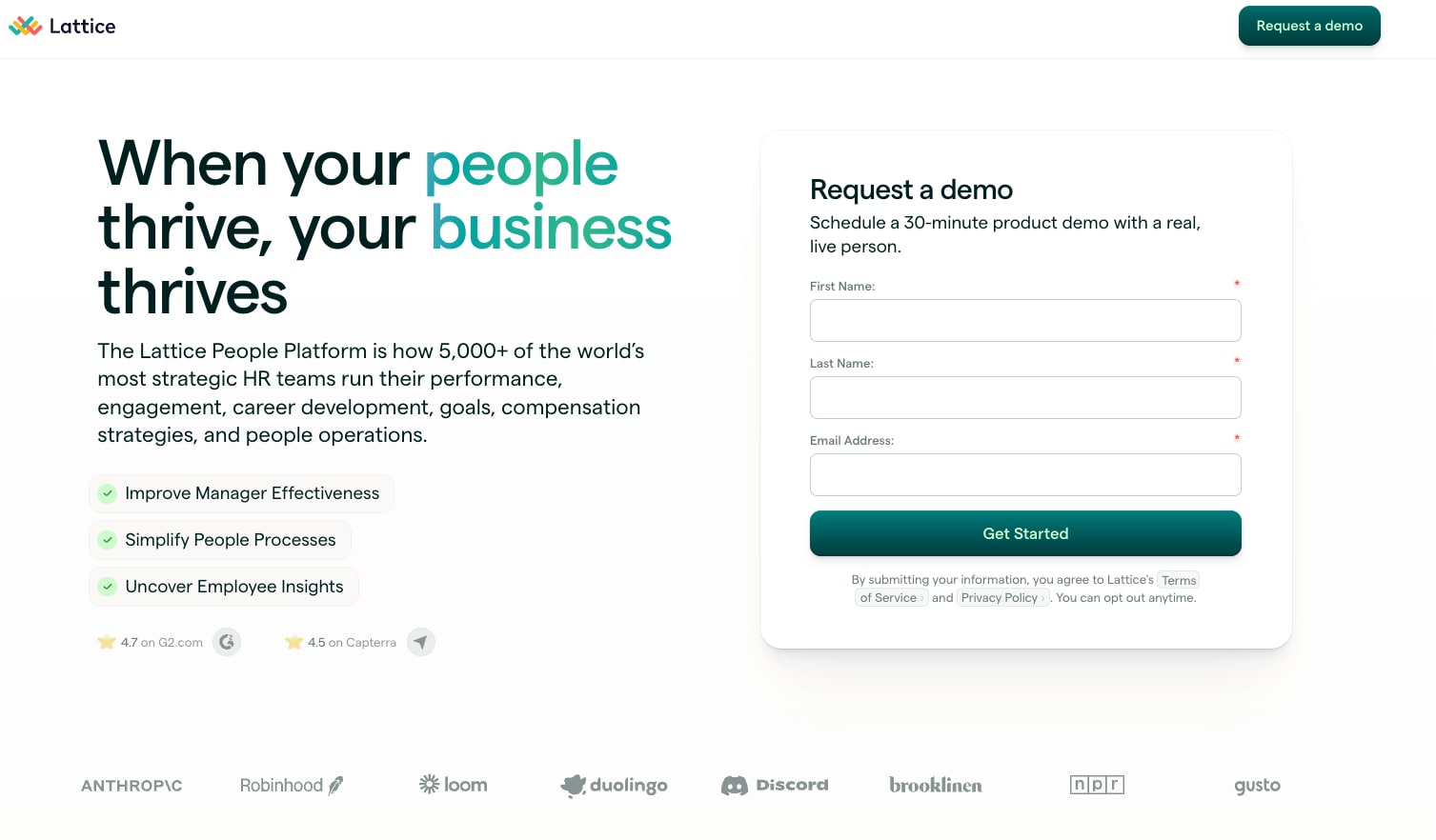
Lattice is engineered to turn performance management from a dreaded annual ritual into a continuous growth engine that drives real business results. The platform specializes in connecting individual performance to company strategy through intuitive goal-setting and feedback tools, making it ideal for mid-sized to large organizations focused on building high-performing cultures.
Example:
The platform is built to help organizations align employee performance with business objectives through continuous feedback, goal tracking, and data-driven insights that foster growth and accountability.
Key features:
- OKRs and goal management: Set, track, and align objectives across the organization with visual dashboards and real-time progress monitoring
- Performance reviews and 360-degree feedback: Flexible review cycles with peer feedback, self-assessments, and structured 1:1 meeting tools
- Employee engagement surveys and analytics: Pulse surveys, eNPS tracking, and people analytics to provide actionable insights into team performance
Pricing:
- Talent Management (Foundations): $11/month per seat
- HRIS (Core HRIS): $10/month per seat
- Add-ons available for both packages
- Minimum annual agreement of $4,000
- HRIS currently available for US-based businesses only
Considerations:
- Goal-setting and OKR features require separate pricing bundles, which can increase overall costs
- Mobile app experience is less robust compared to the web platform, limiting on-the-go functionality
7. Workday

Designed for large organizations managing complex global workforces, Workday offers enterprise-grade software that integrates talent management with comprehensive HR and financial systems. The platform is ideal for enterprises that need unified visibility across people, projects, and performance data.
Example:
Its core strength is connecting performance management with broader business operations, giving enterprise leaders real-time insights into how talent performance impacts financial outcomes and strategic goals.
Key features:
- Comprehensive talent management suite with skills-based performance tracking and development planning
- Advanced analytics and reporting that connects performance data with financial and operational metrics
- Global compliance capabilities ensuring performance processes meet regulatory requirements across multiple countries
Pricing:
- Workday Adaptive Planning: 30-day free trial available
- Custom enterprise pricing: Contact Workday sales for detailed quotes based on organization size and requirements
- AWS Marketplace: Available for purchase through AWS with existing spend credits
Considerations:
- High implementation costs and complexity make it primarily suitable for large enterprises with substantial budgets
- Steep learning curve and rigid structure can be challenging for organizations requiring highly customized performance management processes
8. ClearCompany

ClearCompany provides a unified talent management system that transforms how organizations handle performance from hire to retire. The platform specializes in connecting recruiting, onboarding, and performance management into one seamless workflow, making it ideal for HR teams who want to eliminate data silos and create a complete employee lifecycle view.
Example:
The platform’s value is in creating a complete talent management ecosystem where performance data flows seamlessly from recruitment through employee development, enabling data-driven decisions across the entire employee lifecycle.
Key features:
- Goal alignment and cascading: Connect individual performance goals directly to company objectives with real-time tracking and progress visibility
- 360-degree performance reviews: Conduct comprehensive evaluations with customizable review cycles, peer feedback, and automated workflows
- AI-powered analytics: Leverage ClearInsights to identify performance trends, predict talent needs, and make strategic workforce decisions
Pricing:
- Custom pricing: Contact ClearCompany directly for tailored quotes based on company size and selected features
- Multiple product bundles: Choose from ClearRecruit, ClearTalent, ClearLearn, ClearGrow, or TotalTalent packages
- Implementation support: Dedicated customer success managers included with all plans
Considerations:
- Limited project management capabilities compared to dedicated work management platforms, focusing primarily on HR-centric performance tracking
- Premium pricing structure may be challenging for smaller organizations with tight budgets
How to choose a performance platform that truly works for your team
Selecting the right platform goes beyond reviewing features. It’s about finding a solution that supports how your team works and grows and eliminating data silos. The most effective systems connect goals, feedback, and progress in one place, giving everyone clarity about what matters.
Start with your team’s processes and communication style. A platform should match your workflows and be simple enough for everyone to use confidently. A clear, intuitive interface is essential for adoption.
Your platform should also connect with the tools you already use. Integrations reduce manual work and help teams access the insights they need to make timely decisions.
Get started with monday work managementYour game plan for a winning performance management rollout
Rolling out a new performance system introduces a more transparent and growth-oriented way of working. A thoughtful plan helps teams adopt the change smoothly and understand its benefits.
Start with a small pilot group to gather early feedback and build internal champions. Provide managers with training that supports effective development conversations, not only system usage. When teams understand the purpose of the new process, they participate more confidently.
Introduce the system in phases and keep the first version simple. With monday work management, you can start with a basic structure and expand as your team becomes more comfortable. This helps create a sustainable, long-term approach to tracking performance.
Build a high-performing team, not just a process
Your performance platform should support how your team grows, collaborates, and makes decisions. When everyone has a clear view of goals and progress, engagement improves and managers can focus on meaningful feedback.
monday work management provides a single place to track goals, review progress, and connect performance to the work happening every day. Try monday work management and build a more aligned, confident team.
Get started with monday work managementFAQs
Should small businesses invest in performance management software?
Yes, small businesses should invest in performance management software because it helps establish consistent feedback and documentation as the team grows. This prevents common issues like unclear expectations or missed development opportunities that can lead to turnover.
How do you measure ROI on performance management solutions?
You can measure the ROI on performance management solutions by tracking changes in retention, goal completion rates, review cycle time, and manager–employee touchpoints compared to your baseline before implementation.
Can annual performance reviews work without ongoing feedback?
Annual reviews are more effective when paired with regular check-ins. Ongoing feedback provides context and helps address issues sooner.
Do performance management platforms integrate with existing HR systems?
Yes, most performance management platforms integrate with common HR tools such as HRIS, payroll, and identity providers. Check each vendor’s integration list for specifics.
How do performance management platforms support remote teams?
Performance management platforms support remote teams by providing remote teams a shared place to track goals, exchange feedback, and record updates so everyone stays aligned regardless of location.
What features should you prioritize in performance management software?
When choosing performance management software, you should prioritize features like goal tracking, flexible review cycles, feedback tools, analytics, and integrations that fit your existing processes.

